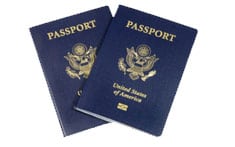Expats with US passports fear they could be marooned overseas if they fall foul of new tax laws proposed in Washington.
Any US taxpayer owing US$50,000 to the Internal Revenue Service would have their passport revoked until the debt is settled under the terms of the Surface Transportation Bill that is progressing through Congress.
The bill includes funding for bridge and road repairs, building federal highways, public transport and other projects. Part of the funding will come from the payment of taxpayer debts.
The bill was passed by the Senate in April, is under discussion in the House of Representatives. Approval will mean President Obama will have to sign off the bill to make it law.
The Surface Transportation Bill is scheduled to start from January 1, 2013, and is expected to raise $743 million over 10 years.
Expats and lobby groups are protesting the proposed law will unfairly affect the 7 million US taxpayers living overseas.
Under US law they cannot enter or leave the country without a valid passport.
American Citizens Abroad (ACA), an organisation for expats, said: “Americans overseas have a much more complicated process of declaring US taxes, and therefore, the possibility of making mistakes is greater than for those in the US.
“In addition, this provision would cause considerable discrimination against Americans living and working abroad, who often need their passport as an identity paper on a daily basis.”
US expats are advised to apply for a ‘back-up’ passport in the country where they live.
“Hundreds of thousands of individuals are already dual nationals, frequently by birth. If their US passport is revoked or they are not allowed to renew it, at least they will not be, in a sense, stateless, unable to travel from one foreign country to another and, as a practical matter, forced to return to the US,” said lawyer Charles Bruce, on the ACA web site.
“Some individuals who think these rules make their situation untenable, or may in the future make it untenable, may choose to renounce their US citizenship. Depending upon circumstances, they may have to pay up in order cleanly to renounce.”
